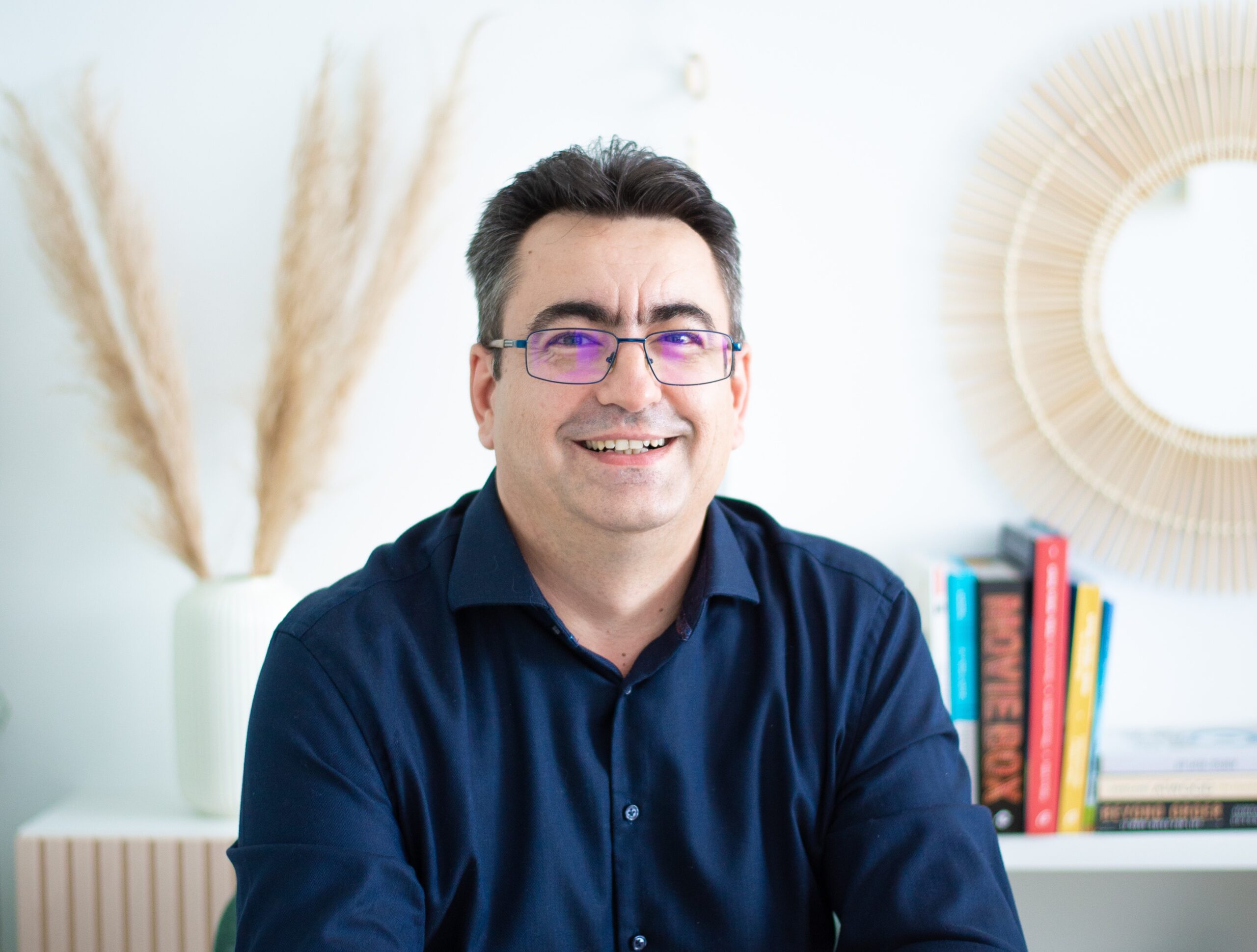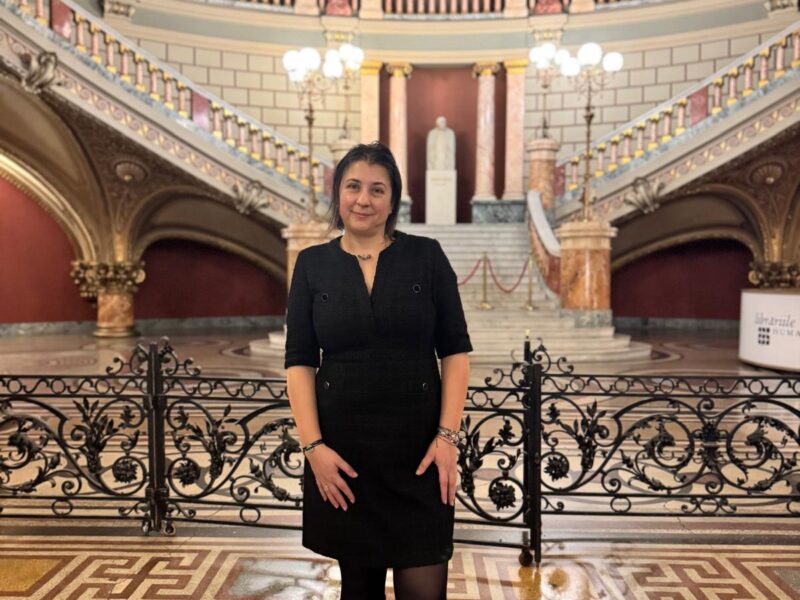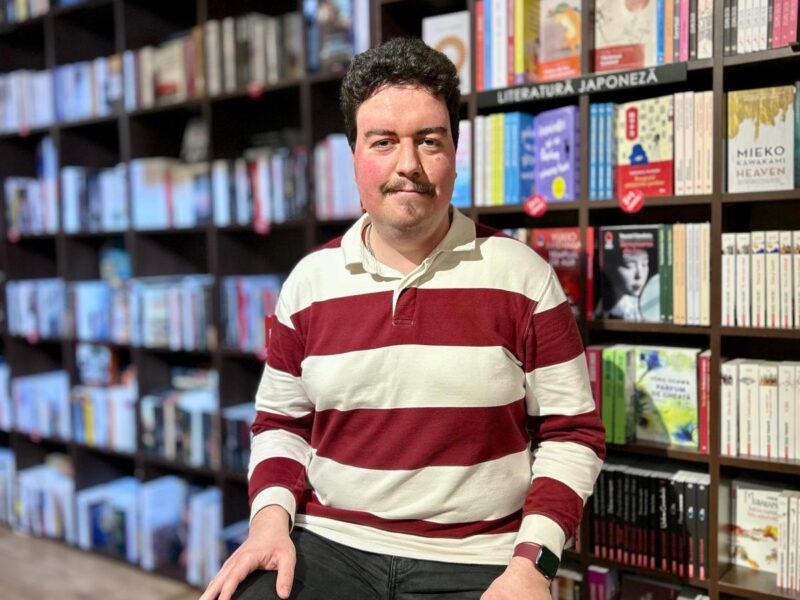Silviu Săndulescu is a literary agent, founder and director of the Rights Expert Agency. He started his adventure in the book industry in 2003, as Marketing Manager at Niculescu Publishing House, where he implemented and worked with the vision and tools he acquired at Open Public Service, a very large direct marketing agency. After seven years at Niculescu, he moved to the European Licensing Company, where he was in charge of managing huge licensing companies such as Warner Bros. and DC Comics. After the same magical seven years, Silviu opened his own rights agency. At first he sold translation rights only in Romania, but gradually expanded to more and more territories in Central and Eastern Europe. On the eve of another seven-year anniversary of Rights Expert, it's clear that Silviu Săndulescu has all the makings of a fairytale career; not only has he expanded his portfolio and client list, but he consistently manages to pass the toughest test: selling translation rights abroad for Romanian authors. The most exciting part? That he does it all with professionalism and passion at the highest level.
You started your career in the publishing world at Niculescu Publishing House, where you were Marketing Manager for seven years. How did you get to Niculescu and what was the book market like in the early 2000s?
I came to Niculescu Publishing from the largest direct marketing agency in Romania (Open Public Service), where for a long time I was in charge (at a rather young age) of the most important client, Microsoft Romania, by far the most complex direct marketing client in the industry at that time. It was the era of mailed out slips, campaign support phone lines and the dawn of email marketing. Working with Microsoft was a fantastic school from which I learned, first of all, about the importance of databases in the relationship with end customers: how to create, maintain, expand and update them.
Niculescu Publishing House had one of the largest Book Clubs in Romania (with over 60,000 members, if I remember correctly) and I saw the perfect opportunity to apply what I had accumulated in agency work in a large publishing house. In addition, the publishing market inexplicably attracted me - I still don't have a clear answer why. 
Obviously, the publishing reality of those times was different from what I thought. For someone who is idealistic, who sees books as a cultural asset, it is a bit of a shock when they discover them as a commercial product like any other.
The book market of that period still bore the traces of the glorious 70s1990s and print runs of tens and hundreds of thousands of copies, but the reading crisis had already begun and it was everywhere. Distribution was conditioned by the dwindling number of bookstores (something that has continued and exacerbated today, unfortunately), international customers such as the big hypermarket chains still had a discreet presence, and bookstore chains and independent bookstores were still the major players. Online mainly meant selling from publishers' websites and only 1-2 online shops that were just starting to establish themselves. Mail order book sales as a result of direct marketing campaigns (sending out catalogues with titles and offers) were extremely popular.
What were your marketing tools in the 2000s, how did you use them and what changed by the end of the decade?
The tools were quite diverse but, one over the other, the biggest challenge was marketing without a budget, with the corollary of marketing using barter books. 
Based on the existing conditions, we developed or created, as the case may be, marketing tools to adapt to the situation.
We developed the existing network of local media partners (newspapers, local radio and TV stations) through which to promote the books. The first radio spot followed. Itsy Bitsy. Simple but memorable. Barter, obviously.
Direct sales catalogues to book club members were an important way to reach a different audience. Challenges: beating up on DTP department so we could do them. Does it go in the mail or not? Do they all get to the recipients? Are the orders coming in? Do we have the books to honor requests? How do we expand the database?
Niculescu's logo stickers. Besides the challenge of placing them in bookstores, I can't forget the technique of removing the air bubbles when the gluing is done. I discovered the power and technique of wielding a pin to burst the bubbles created by a sticker on impact with the plexiglass.
First roll-up. The idea of having a mobile system on which you could print advertising messages and change the material at every event was truly revolutionary in those days, and not just in the book market! When we brought the roll-up system into the publishing house and displayed it in the meeting room there was a general pilgrimage. The satisfaction with demonstrating how easily it fitted and tightened – priceless 
Posters in bookshops - revolution among the distribution people. "Sir, are you going to make me argue with the booksellers for putting posters on the windows and then there's tape or glue marks and no one to wipe them off?"
Book fairs. By far the most visible and energy-consuming events, but also the most rewarding. The eternal dispute - should we at least spend our money on the stand versus is it an event where we invest primarily in our image and positioning as a publisher. Direct contact with readers. The pleasure of talking to them, recommending books, seeing their instant reaction. Crowd. Book launches. Print and TV interviews. Sleepless nights. Does the inventory come out at the end?
Giant dictionary. There were many memorable moments at the fairs. I remember that we had just launched the first dictionary created by Niculescu, and one of the promotional ideas was to make a giant dictionary out of a parallelepipedal wooden frame covered with banner material on which the cover of the dictionary would be printed. And then we'd put the resulting thing up on the publisher's stand. I can still see the confused look on the faces of the Romexpo people when they had to set it up and then take it down 
In the latter part of your time at Niculescu, you were also in charge of the distribution of the Oxford University Press portfolio, with which the publisher had entered into a partnership. What did this entail and what were the channels used?
Actually, we were sort of running the roles in parallel. The Oxford project brought, from the start, the feeling that we were starting to play in a higher league. There are still memories of the pitchperiod, when we had to put together a solid offer to take over the distribution of Oxford University Press. It was an extremely complex job, with Andrei Niculescu, who was just starting out in publishing, extremely committed and ambitious.
Network of kindergartens and private schools. The first steps in establishing Oxford in a market where we discovered that brand is not always enough, as there were already extremely strong players with a well-developed network and often lower prices. The satisfaction of convincing, in a one-to-one discussion, where we often started with second chances - priceless.
Sales training at Oxford. Parachuted into the elitist city of Oxford, we find ourselves bombarded with sales techniques that we look at with the superiority of those who know best. Surprised that they actually work.
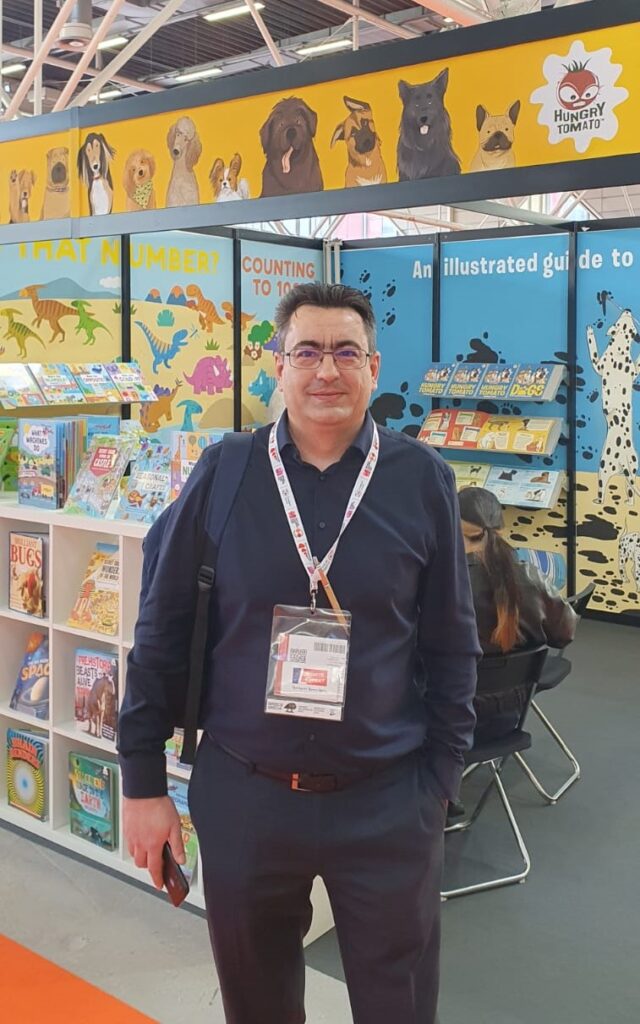
After Niculescu, you spent another seven years with the European Licensing Company team, where you were in charge of the management of some of the best-known international licenses in Romania, including Looney Tunes, Tom&Jerry, Angry Birds, FC Barcelona and Juventus Torino. What is involved in selling these licences?
The move to the European Licensing Company came after an offer that simply could not be refused. Although I was and still am very close to Niculescu Publishing House, I felt it was the right step to take and an opportunity that doesn't come along every day. It was probably one of the hardest professional decisions, the break up was extremely hard and came after a few sleepless nights of turning arguments on all sides.
Coming back to the European Licensing Company (ELC), we are talking about the largest licensing agency in Central and Eastern Europe. What's more, it was almost like a radical change of field. Although publishing was an important category, educated and with contracts in place, it was not the most important in terms of financial potential.
By definition, licensing is the process whereby a licensee "lends" the license/brand to a licensor for a limited period of time, subject to clearly defined rules that do not alter that brand.
The mechanism is apparently simple: you represent a brand, cartoon character or football club, and the aim is to get it to appear on as many different types of products as possible, from sweets, non-alcoholic drinks to school supplies, toys or clothing. And if it doesn't appear on products, help promote them. Or both.
Simply listing the brands I've represented over the years says enough about the pressure that exists, especially in a market that is still being educated and in the throes of a 2010s crisis: from Warner Bros. - Scooby Doo, Tom and Jerry, Looney Tunes (i.e. Bugs Bunny, Duffy Duck, Tweety, Porky Pig etc.), DC Comics (Superman, Batman, Wonder Woman etc.), from Turner Enterprise - Cartoon Network - Ben 10, Bakugan, Powerpuff Girls. Then, for shorter periods: Rovio - Angry Birds, Fox (Ice Age, The Simpsons etc.). Last but not least, football clubs: Barcelona, Real Madrid, Manchester United or Juventus.
What has it been like to move from working with distributors/book buyers to interacting with a much more diverse range of customers? How have you adapted your working methods and tools?
Suddenly the whole universe you are used to changes. From friendly private school headmasters or friendly visitors at book fairs, you are thrown in front of marketing directors or CEOs of multinational or local companies, in front of whom things have to be presented completely differently. Numbers matter, you have a powerful, universally known licensor behind you with high financial demands, which you have to get from customers in the Romanian market. Negotiations are by no means simple, they take much longer, every figure and clause is negotiated in blood.
Of course, there was no shortage of situations here either, in the many sales meetings we had over the years, where we had to educateethe market, explaining what licensing is. We also had the ever-present objection: sir, but why should we give you money to use character X, when you should give us money for doing you the honour of putting it on our products?
How can a company that administers such licenses control what is actually happening in the market, keep track of the many and varied uses of a brand?
Any contract between licensor and licensee also includes an audit part, which automatically means that the owner of the licence can check, directly or through an agent, how the licensing project is going. Obviously, before that, the agent has a very important role: he has to follow the whole process by which a licensed product reaches the market, from the initial contracting part, then the approval of the packaging design and ending with the presence on the market.
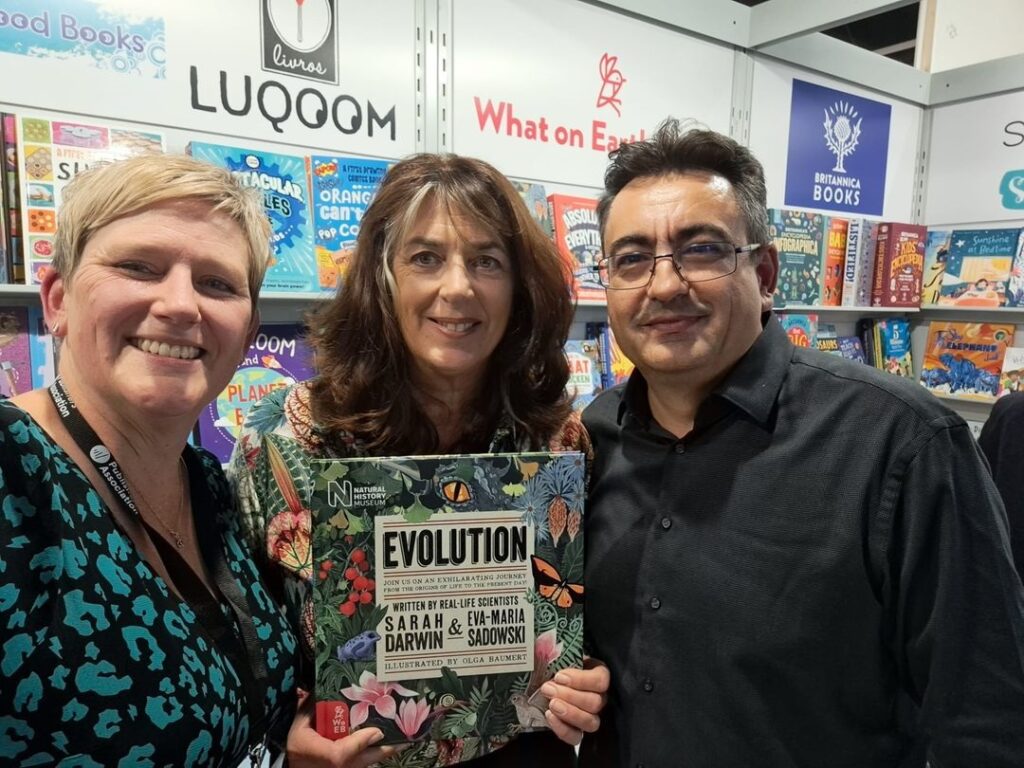
It will soon be another seven years since you set up your own copyright and licensing agency - Rights Expert. Here's wishing you a jubilee at least. How and why did you make this change?
Thank you very much! It was a natural step, one I had been aiming for for a long time. It was the moment when I was probably the most prepared and when all the planets aligned. Initially the company was more active on the licensing side, but first love doesn't forget, so since 2017 I made the transition to predominantly literary agency activities.
How did you build your client portfolio?
Easier than I expected, it just took time and patience. The first 2 years were a bit more difficult, but I kept steadily adding publishers to my representation. From the beginning I have been looking for publishers that are creative, flexible, independent and preferably have a constant participation in big book fairs (Bologna and Frankfurt). Most of my portfolio is represented by children's book publishers, but I also have solid adult non-fiction publishers.
Obviously, at that point in 2017 I had no way of knowing that after 1-2 years of consolidation there would come a pandemic and then a war in the area...
I was definitely doing something right, and I still am, because from a certain point on I started to be recommended by partners I was already working with or people who had left the publishers I was working with.
It seems like every moment of my career is linked to a household name. If at Open Public Services it was Microsoft, at Editura Niculescu it was Oxford, at ELC it was Warner Bros. (not to mention big names like FC Barcelona, Angry Birds, Scooby Doo, Tom & Jerry), when I opened the literary agency, I was really wondering what other household name I could have in my portfolio. Although I represent Sweet Cherry Publishing (Independent Publishing Awards Children's Publisher of the Year), Michael O'Mara (International Achievement of the Year – - Independent Publishing Awards), Affirm Press (Bologna Prize nominee for Best Children's Publishers of the Year), Exisle / EK Kids (double Bologna Prize nominee for Best Children's Publishers of the Year), Red Comet Press (Bologna Prize nominee for Best Children's Publishers of the Year), probably the most resonant name is Britannica Books - What On Earth Books. This is thanks to another extremely special person - Rachel Pidcock from The Rights Solution literary agency. If anyone can embody English calm and humour combined with professionalism and generosity, Rachel is that person.
Rachel, along with Aby Man (who I knew and had worked with since the start of my agency) and Gwen Benett set up The Rights Solution, an agency that has around 30 publishers in representation, including Britannica Books. And here we seem to have done something right, since we've expanded the collaboration from Romania and Moldova to Bulgaria, Croatia, Slovenia and, recently, the Czech Republic and Slovakia.
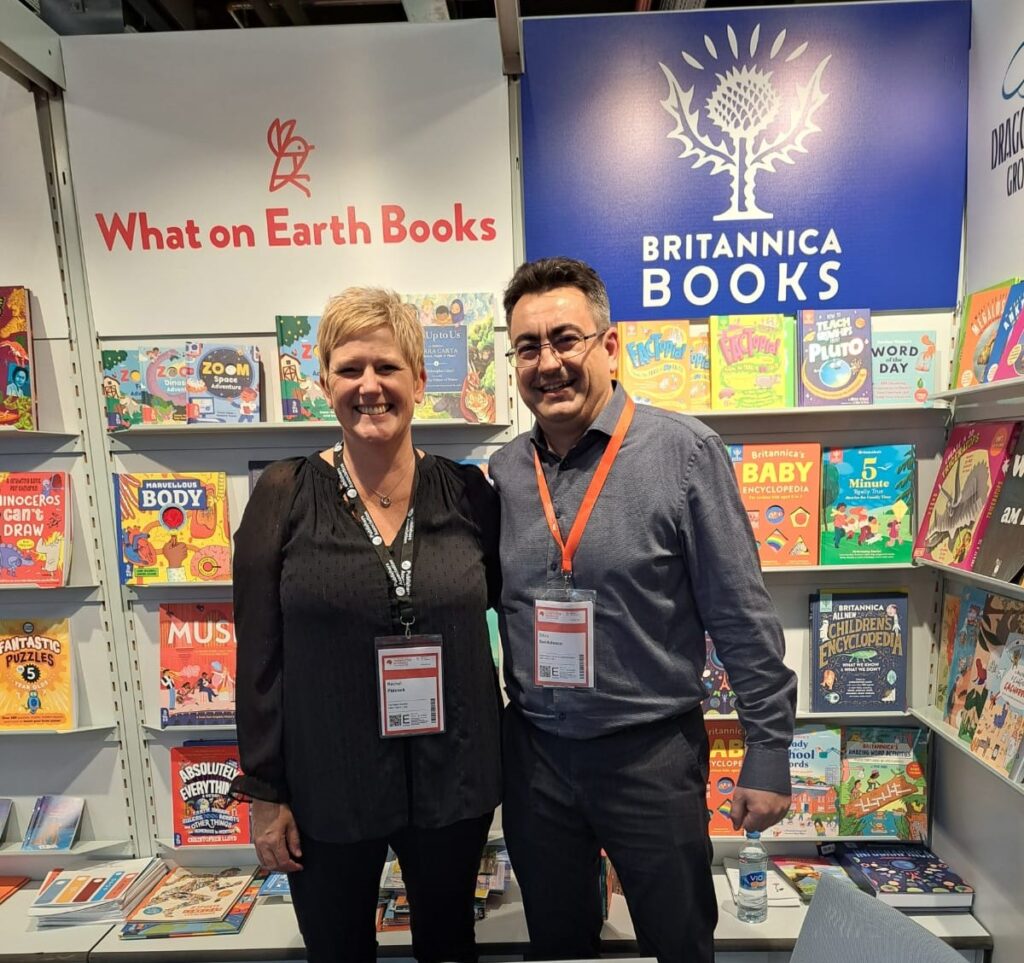
I imagine you already had solid contacts with some publishers or other companies interested in licensing in Romania. How did they react when you became an entrepreneur and how did you reach out to new ones?
In various ways. I felt both encouragement and distrust, which is absolutely normal. Over time, both by increasing the portfolio of publishers represented and, I hope, a certain seriousness, I ended up increasing the number of end customers. I can say that at the moment in Romania I work with several dozen publishers, from very small to very large ones.
How do you manage to control the flow of collections from publishers, sales reporting and other tasks that usually give agents a headache?
A lot of work, emails sent at 10pm or 6am, reporting on weekends. Lots of organisation. I've had part-timers over the years to help me on the back-office side. And in the future, this will continue.
You started by working only in the Romanian market, but gradually expanded to other European territories. How did you reach your foreign partners and how do you keep in touch with them?
That's how I thought about the business from the beginning. We were already entering a very crowded Romanian market, with agencies that had been established for a long time. Plus the foreign agents working here, plus the direct negotiations between foreign publishers and the ones here. It was obvious that we needed other markets.
Although it was an extremely difficult period, paradoxically, the pandemic gave me the opportunity to think more seriously about this development, to research the markets, to build the databases and to have the courage to ask the partners I represented in Romania to give me representation in other territories. To my delight, many of them accepted and so I managed to have substantial portfolios in the countries in the region. So now I can say that, besides Romania and Moldova, I am active in Bulgaria, Czech Republic, Slovakia, Serbia, Croatia, Hungary, Slovenia and Poland.
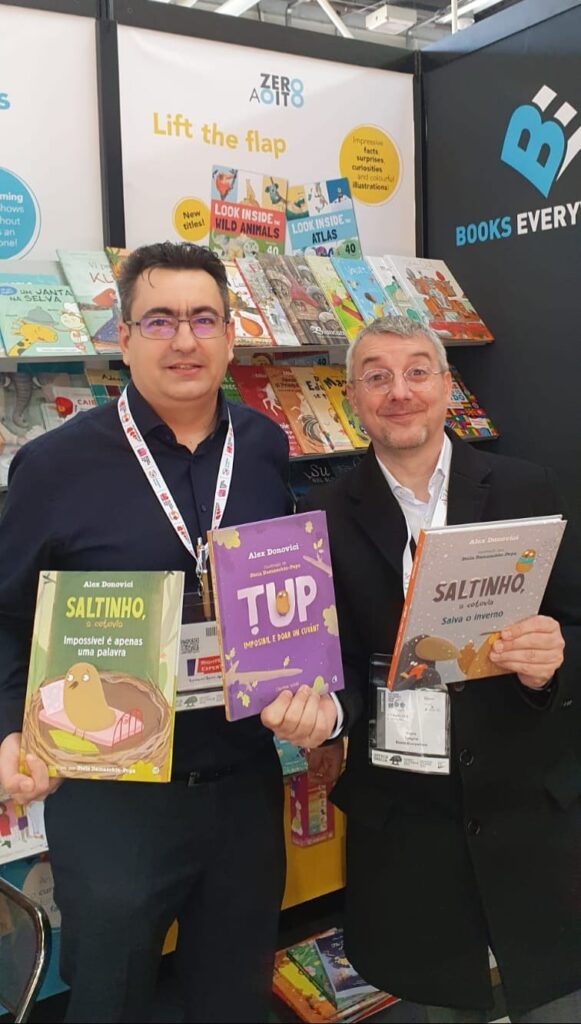
One of Rights Expert's most successful projects is the sale of the translation rights of the Țup/Hoppy series written by Alex Donovici, illustrated by Stela Damaschin-Popa and published by Curtea Veche Publishing. Țup seems to have conquered the world. How did this adventure begin and how did it continue?
It started with many raised eyebrows of puzzlement and disbelief, with encouragements like "this can't be done, you're wasting your time, better to concentrate on something else". Instead of discouraging me, these things only made me more ambitious. Then again, I'm a pretty stubborn guy (my wife can testify to this best). It seems to have been among the few times I've managed to turn this into something really useful...
Another item - the pandemic. I had plenty of time to rethink what I wanted to do, and it was also a time when the Romanian publishers with whom I had started representation discussions were even more open to the opportunity. Then followed a period of trial, error, and strategic rethinking. The country brand is not helping us and the competition is fierce. Anyone who has visited a book fair in Bologna or Frankfurt knows what I am talking about. You're basically competing with literally everyone.
On the other hand, there are good Romanian illustrators and authors, and I was and still am simply unhappy that we are not as present, aggressive and involved as other countries - and here I would especially refer to those close to us, with whom we can theoretically compare.
And this has been a component of the business from the very beginning, since the agency was founded. At the European Licensing Company, we imported rights and I always thought that the reverse step would be more rewarding, although much harder.
The trigger was a meeting, at one of the first Frankfurt trade fairs I attended as an agent, with a publisher in the UK who was not small but tiny. He was an enthusiastic young man, who cheerfully presented me a few A4 coloured pages of what was to be his first series of books. After the meeting, I couldn't help thinking how someone who didn't even have a published book was already at the world's biggest book fair trying to sell translation rights. I repeat, of books that didn't yet exist, from a publisher that hadn't yet appeared. I realised the difference in mentality and told myself that, although I might not be able to move mountains, I can certainly try to do something coherent and structured in promoting Romanian authors and publishers.
Then there was a meeting with the right man at the right time - Mauro Spagnol. After more than 15 years of selling royalties to prestigious publishers, Mauro decided to open his own agency, Books Everywhere. The timing was perfect – - April 2020, just when everyone was in lockdown and absolutely no one was thinking of publishing books or buying rights. One person I'm particularly fond of, Helen Pickford (of Michael O'Mara Books, the publisher I've represented in Romania since the agency's inception), with whom I worked and work very well, was part of Mauro's project. When it came to the question of which network of agents Books Everywhere should work with, Helen said to Mauro: "I know the perfect man for you in Romania and beyond. You'll get on perfectly." Then came her plea for me to consider the project. What followed was something of an instant click. I discovered a charismatic, stubborn, headstrong, book-loving Italian with a business vision similar to mine. Although based in the UK for a very long time, his project is counter-current, namely to represent publishers outside the English language space. In May-June 2020 we had the first discussions. We got along perfectly. In September we officially started the collaboration and a few days later the first signed contracts appeared in a Romania where, from one week to the next, we didn't know if we were in quarantine or not, and the bookshops, not being slots or bookmakers, were closed rather than open. Naturally, I suggested that he also represent Romanian authors, and the first proposal I made to him was the Țup/Hoppy series written by Alex Donovici, published by Curtea Veche. Mauro was instantly won over by the story, the characters and Alex's writing. Not even 2 days after sending the materials, his answer was a very clear YES. From that moment on, as they say, the rest is history. The first contract was in Turkey, then followed Hungary, Slovakia, Korea, Vietnam, China (contract for all 5 existing titles at that time plus a sixth, unwritten yet), Czech Republic, Spain, Portugal, Poland, Serbia.
What can I add? About Alex Donovici: impetuous, sometimes maybe pushy, but extremely passionate in everything he does. The kind of person you need when you set out to conquer the world. Nothing would exist if he didn't have the inspiration to write, to pour his heart out and reach the hearts of so many parents and children.
Curtea Veche: among the first publishers who had the courage to hand over their foreign representation to me. My thanks will always go to Barna Nemethi, Irene Arsene and Dana Dincă.
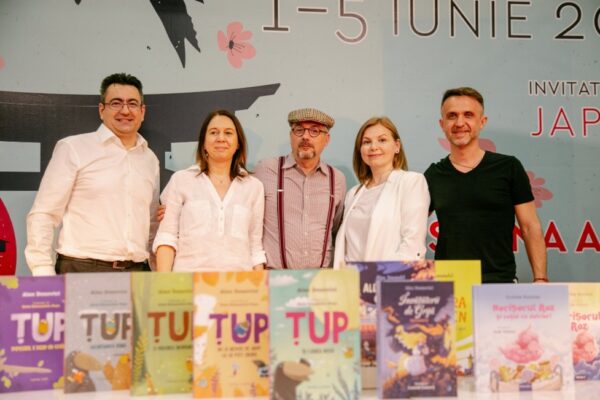
Do you collaborate with other Romanian authors? How different is the selling of rights (and licences) in Romania compared to selling the Romanian ones abroad?
Yes, I'm glad I managed to make a real dream-team of Romanian authors who have both sales and success among the young and old readers: Alex Donoici, Alec Blenche, Ioana Chicet-Macoveiciuc, Cristina Andone, but also authors I believe in very much: Olina Ortiz, Ramona Miza, Zully Mustafa. But the credit also goes to the publishers who agreed and support this approach: Curtea Veche, Univers, Nemira, Nomina and others.
A special mention goes to Alec Blenche and Univers Publishing House. Not so long ago, we succeeded, by working with Mauro, in making him become the first Romanian author of children's books (and not only) who, in a single contract, sold 15 books in a series. Another example that we have authors and illustrators with whom we can compete on equal terms in the international rights market.
But wait, there is more: shortly we will announce another (already signed) equally spectacular contract from another publisher we represent. Not to mention the countless open discussions for Romanian authors' titles in our portfolio.
Selling Romanian books abroad has a much higher emotional stake. The challenges are infinitely different. It is much harder than the classic business model where the agent brokers the sale of rights from foreign publishers to a domestic market. It involves a lot of time, which in theory I could have channeled into importing and which would have perhaps brought in more revenue in the short term. But if it were easy, where would the glamour be?
The best part is that, after a few years of hard work, you feel that you have made the right choice and that what you only dared to believe was possible is becoming a reality. It is that feeling that you present, on the same level, books by Romanian authors with books by foreign authors. It's the moment when potential customers from other countries ask you what's new in Romania. And, above all, the clear feeling that the snowball has just started to roll and that many more beautiful stories will follow. And yes, you are still competing with literally everyone. And yes, Poland, for example, has, at big international fairs, the national stand divided into mini-stands where Polish publishers sell rights. And yes, many countries support local authors and publishers with significant grants. And yes, you come from a market that is still not as consolidated as it should be. And yet you feel you can compete on equal terms with a lot of people. And yes, we've evolved a lot more than we realize at this point.
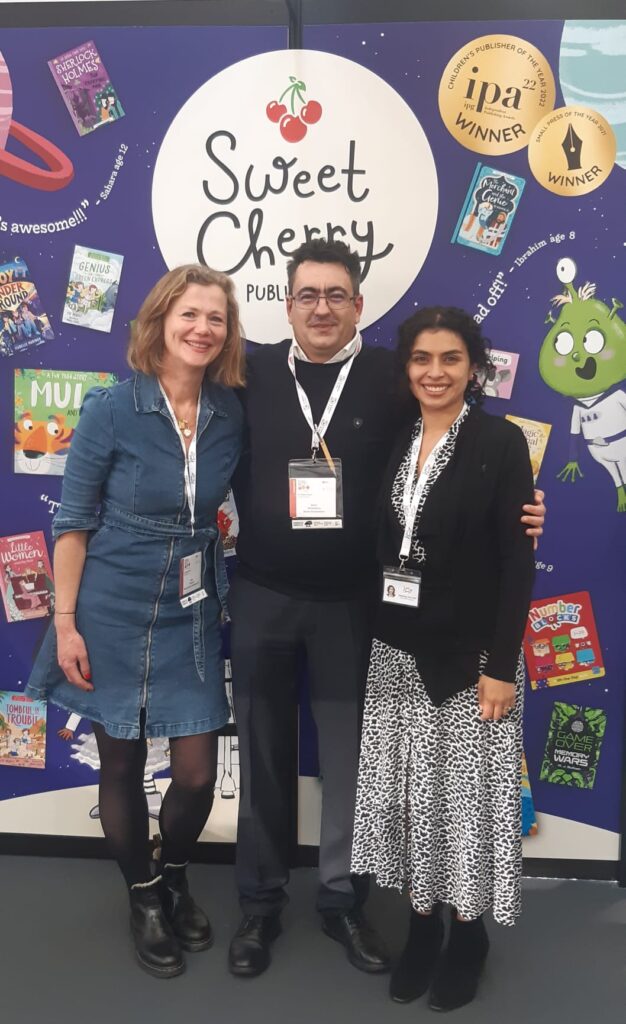
What have been your greatest professional joys so far? What about the biggest challenges?
When I realise that what 7 years ago was just an excel or a powerpoint in my mind is now an agency that operates in 10 markets, has dozens of publishers as active clients and has brokered the sale of many hundreds of titles I can only feel satisfaction.
Selling Romanian authors abroad is probably similar to what great footballers say when they play for the national team: although it doesn't necessarily seem to offer material rewards, it's a state that you can't describe and that gives you much more satisfaction. The adrenaline rush of negotiating and signing an 'export' contract is nothing compared to the similar feeling of 'import' contracts.
Meeting so many sensational people both from Romania and all over the world. I know we are subjective, but I believe we work in the most beautiful industry in the world.
First contracts signed with partners in Central Europe. I remember a contract for a series of over 20 titles for a kiosk edition project in Poland. If I were to print out the correspondence I had then, it would certainly result in a lesson in negotiating in blood, which can always be taught as a case study.
On challenges: pandemic plus war. Fighting the country brand. Plus the struggle to collect the bills.
What does your stack of unread books on your nightstand look like, and which book have you enjoyed most lately?
Lately I've been seduced by Jonathan Franzen, an author I've had on my list for a long time, but whose turn to read has only now come. The Corrections has me head over heels, especially as some of the plotlines of the novel overlap with events I've recently experienced and that made it all the more powerful and memorable for me. Now I'm on to Freedom, which I'm enjoying and where Franzen doesn't disappoint. Purity, also by Franzen, waits its turn patiently. Otherwise, the bookshelf is always full of books in quite different areas, from adult non-fiction to children's books (of professional interest).
[The photos are part of Silviu Săndulescu's archive.] [Translated into English by Oana Dragomir.]

